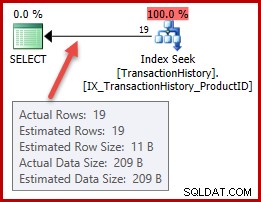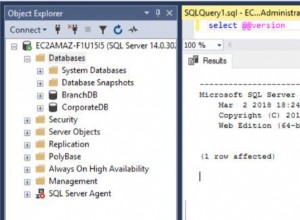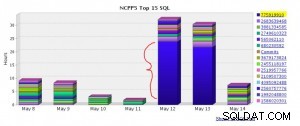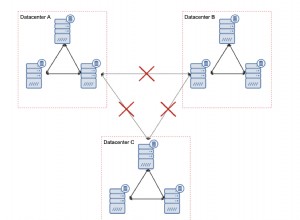Existem várias maneiras de fazer isso. Vou listar duas maneiras. Cada um tem vantagens e desvantagens. Eu pessoalmente usaria o primeiro (SQL Dinâmico).
1. SQL dinâmico
- Vantagens:Rápido, não requer recursão
- Desvantagens:não pode ser usado para atualizar variáveis de tabela
2. CTE recursivo
- Vantagens:Permite atualizações de variáveis de tabela
- Desvantagens:Requer recursão e uso intensivo de memória, CTEs recursivos são lentos
1.A. SQL dinâmico:tabelas regulares e tabelas temporárias.
Este exemplo usa uma tabela temporária como fonte de texto:
CREATE TABLE #tt_text(templatebody VARCHAR(MAX));
INSERT INTO #tt_text(templatebody)VALUES
('This is to inform #first_name# about the issues regarding #location#');
CREATE TABLE #tt_repl(variable VARCHAR(256),template_value VARCHAR(8000));
INSERT INTO #tt_repl(variable,template_value)VALUES
('#first_name#','Joseph William'),
('#location#','Alaska');
DECLARE @rep_call NVARCHAR(MAX)='templatebody';
SELECT
@rep_call='REPLACE('example@sqldat.com_call+','''+REPLACE(variable,'''','''''')+''','''+REPLACE(template_value,'''','''''')+''')'
FROM
#tt_repl;
DECLARE @stmt NVARCHAR(MAX)='SELECT 'example@sqldat.com_call+' FROM #tt_text';
EXEC sp_executesql @stmt;
/* Use these statements if you want to UPDATE the source rather than SELECT from it
DECLARE @stmt NVARCHAR(MAX)='UPDATE #tt_text SET templatebody='example@sqldat.com_call;
EXEC sp_executesql @stmt;
SELECT * FROM #tt_text;*/
DROP TABLE #tt_repl;
DROP TABLE #tt_text;
1.B. SQL dinâmico:variáveis de tabela.
Requer ter a tabela definida como um tipo de tabela específico. Exemplo de definição de tipo:
CREATE TYPE dbo.TEXT_TABLE AS TABLE(
id INT IDENTITY(1,1) PRIMARY KEY,
templatebody VARCHAR(MAX)
);
GO
Defina uma variável de tabela desse tipo e use-a em uma instrução SQL dinâmica da seguinte maneira. Observe que não é possível atualizar uma variável de tabela dessa maneira.
DECLARE @tt_text dbo.TEXT_TABLE;
INSERT INTO @tt_text(templatebody)VALUES
('This is to inform #first_name# about the issues regarding #location#');
DECLARE @tt_repl TABLE(id INT IDENTITY(1,1),variable VARCHAR(256),template_value VARCHAR(8000));
INSERT INTO @tt_repl(variable,template_value)VALUES
('#first_name#','Joseph William'),
('#location#','Alaska');
DECLARE @rep_call NVARCHAR(MAX)='templatebody';
SELECT
@rep_call='REPLACE('example@sqldat.com_call+','''+REPLACE(variable,'''','''''')+''','''+REPLACE(template_value,'''','''''')+''')'
FROM
@tt_repl;
DECLARE @stmt NVARCHAR(MAX)='SELECT 'example@sqldat.com_call+' FROM @tt_text';
EXEC sp_executesql @stmt,N'@tt_text TEXT_TABLE READONLY',@tt_text;
2. CTE recursivo:
As únicas razões pelas quais você escreveria isso usando um CTE recursivo é que você pretende atualizar uma variável de tabela ou não tem permissão para usar o SQL dinâmico de alguma forma (por exemplo, política da empresa?).
Observe que o nível máximo de recursão padrão é 100. Se você tiver mais de 100 variáveis de substituição, deverá aumentar esse nível adicionando
OPTION(MAXRECURSION 32767) no final da consulta (consulte Dicas de consulta
- MAXRECURSION ). DECLARE @tt_text TABLE(id INT IDENTITY(1,1),templatebody VARCHAR(MAX));
INSERT INTO @tt_text(templatebody)VALUES
('This is to inform #first_name# about the issues regarding #location#');
DECLARE @tt_repl TABLE(id INT IDENTITY(1,1),variable VARCHAR(256),template_value VARCHAR(8000));
INSERT INTO @tt_repl(variable,template_value)VALUES
('#first_name#','Joseph William'),
('#location#','Alaska');
;WITH cte AS (
SELECT
t.id,
l=1,
templatebody=REPLACE(t.templatebody,r.variable,r.template_value)
FROM
@tt_text AS t
INNER JOIN @tt_repl AS r ON r.id=1
UNION ALL
SELECT
t.id,
l=l+1,
templatebody=REPLACE(t.templatebody,r.variable,r.template_value)
FROM
cte AS t
INNER JOIN @tt_repl AS r ON r.id=t.l+1
)
UPDATE
@tt_text
SET
templatebody=cte.templatebody
FROM
@tt_text AS t
INNER JOIN cte ON
cte.id=t.id
WHERE
cte.l=(SELECT MAX(id) FROM @tt_repl);
/* -- if instead you wanted to select the replaced strings, comment out
-- the above UPDATE statement, and uncomment this SELECT statement:
SELECT
templatebody
FROM
cte
WHERE
l=(SELECT MAX(id) FROM @tt_repl);*/
SELECT*FROM @tt_text;




